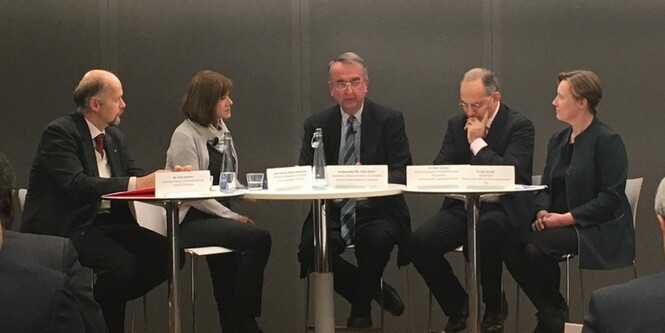
This landmark instrument has helped guide states in over 30 countries to develop their domestic laws and procedures for international disaster response, and laid the foundation for more effective and efficient relief operations.
Celebrations of this milestone anniversary took place in Geneva and New York in December last year, bringing together high-level panellists from governments such as Australia, Mexico and Colombia, international organizations such as the UN Office for the Coordination of Humanitarian Affairs, the World Health Organization and the IFRC, and academia, to highlight the significance of this anniversary, and the role that law can play in making a difference during times of emergency.
“The Swiss government has supported the promotion and implementation of the IDRL Guidelines, and later the Disaster Law Programme, since its very beginning. This is why we are particularly pleased to host today’s event” commented Her Excellency Ms. Sabrina Dallafior Matter, Ambassador and Deputy Permanent Representative of Switzerland to the United Nations in Geneva, as she opened the anniversary celebration. “The importance of the implementation of the IDRL guidelines is obvious: effective governance is clearly a cornerstone of disaster risk management. Strong laws not only create a supportive environment for the efforts of civil society organizations. They also shape the capacities of the government. And they create incentives for safer development practices and ensure that the rights and the dignity of vulnerable populations are protected” she stated.
“Law is important to create a protective enabling environment” added the IFRC Secretary General and CEO, Mr. Elhadj As Sy, in his opening remarks. “But laws alone are not sufficient. We also need good practice”.
Case studies highlighting examples of good practice, and the significant progress made on IDRL across the globe, were shared in a new advocacy report, which was launched to coincide with the anniversary events. This report documents the experience of Ecuador, South Sudan and Vanuatu managing international disaster assistance after a large-scale disaster, which have led to tangible legal and policy change.
With the aim to accelerating progress in the facilitation and regulation of international disaster assistance, and to garner more momentum at the national level in the implementation of the IDRL Guidelines, the IFRC also launched several new tools, including an IDRL Checklist, and Model Emergency Decree jointly with OCHA. These tools serve to complement the IDRL Guidelines and provide succinct and easy-to-use guidance for states to improve their domestic laws and procedures for managing international disaster assistance.
Many states have used the IDRL guidelines to build their legal frameworks for disaster response, including those that have been hit hard by disasters in recent years, such as Mexico. “Having clear laws in place enabled the coordination, facilitation and entry of international disaster assistance after the earthquake that stuck Central Mexico last September”, explained Mr. Luis Felipe Fuente Espinosa, Mexico’s National Coordinator for Civil Protection, at the New York IDRL Anniversary Event. Just as important, is the need for all relevant actors to know and understand their roles and the key procedures when it comes to disaster response, as Mr. Espinosa went on to explain. “We all have responsibilities in face of risks”, he remarked.
While the past decade has seen great progress, more work remains to be done. “We are pleased to be part of this important journey”, exclaimed Mr. As Sy, as he reiterated the IFRC’s commitment to taking this work forward into the next decade and beyond, and called for “more principled humanitarian action” across the globe.